 As we previously reported, the new Florida public notice statute set to take affect on Jan. 1 is beset with ambiguity. In general, the statute is designed to give local governments the option to publish notices on their county website in lieu of newspapers. But as the dust has settled from the battle over House Bill 7049, fears about the immediate damage it will wreak on public notice in the state have diminished.
As we previously reported, the new Florida public notice statute set to take affect on Jan. 1 is beset with ambiguity. In general, the statute is designed to give local governments the option to publish notices on their county website in lieu of newspapers. But as the dust has settled from the battle over House Bill 7049, fears about the immediate damage it will wreak on public notice in the state have diminished.
The Florida Press Association (FPA) latest analysis of the statute makes a persuasive case that a substantial number of notices in the Sunshine State will still be required to be published in newspapers even after the statute finally premiers in three months. FPA has always contended that private-party notices, aside from certain foreclosure notices, are exempt from the government website option. But General Counsel Sam Morley’s latest memo to FPA members argues that many other notices that HB-7049 did not explicitly sanction for publication on county websites must also remain in newspapers.
To be sure, the 18 government-agency notices HB-7049 did explicitly invite local governments to publish on county websites are fairly common, including school board, code enforcement and hearing notices. But there are many other government notices spread throughout the state’s legal code. Morley believes they still must be published in newspapers.
“We believe (the) … county website option is only applicable to those notices that authorize use of that website in the various substantive notice provisions in the statutes,” he says in his memo to FPA members.
Questions over which notices qualify to be published on government websites came up during a Citrus County Board of Commissioners meeting on Aug. 30, 2022. Although the question wasn’t settled, commissioners voted unanimously to hold another hearing on Oct. 18 to decide whether to continue publishing notices in the local paper. A report of the meeting in the Citrus County Chronicle suggests the five commissioners are closely split on the issue.
Citrus County appears to be the only rural county in Florida actively considering the website option. The local Chamber of Commerce testified alongside FPA at the hearing and submitted comments opposing the move.
It’s more difficult to get a sense of where the larger counties stand on the issue. Unlike smaller counties with population less than 160,000, they aren’t specifically required by the new law to hold a hearing before exercising the website option. However, local sources tell us that at least Polk County and Broward County are considering it.
For those who want to dig deeper, FPA has also published for its members a valuable Q&A about the new law.
